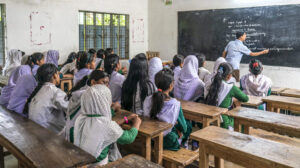
Capt. Hussain Imam
Napoleon Bonaparte said, “Give me an educated mother. I will give you an educated nation.” “Education is the manifestation of perfection already in man,” said Swami Vivekananda. These two sermons should be good enough to understand the importance of education in our lives.
To emphasise the importance of education in our life, eminent educationists, academics, writers, authors, philosophers and social thinkers all over the world have tried to explain it from different angles, highlighting the inevitability of education, quality education in particular, for the onward progress of civilisation. The importance of education in building a nation needs no further elaboration. However, how much Bangladesh, as a least developed country poised to graduate to a developing country by 2026, has been able to give priority to education is debatable.
Bangladesh’s budget allocation for education in the 2023-24 fiscal year does not give any impression on the part of the government to give due importance needed for the overall development of the education sector. According to UNESCO, a country should allocate 6% of its gross domestic product (GDP) or 20% of its budget to education; whereas Bangladesh has earmarked only 1.76% of its GDP (Tk88,162 crore), a mere 11.57% of the total budget.
It is probably high time to do away with any more fancy experiments or misadventures and reform the entire education system so that our future generation can reap the real benefit out of it.
In 2009, soon after coming to power, Prime Minister Sheikh Hasina constituted a committee to formulate the much-needed national education policy with renowned educationists, academics and intellectuals. The committee worked hard and, in the shortest possible time, presented a policy recommendation on the basis of which the National Education Policy 2010 was enacted.
The goals of the National Education Policy 2010 among many were: (a) to ensure proper quality education at each level. (b) to make the country literate and (c) most importantly the education policy has to be in tune with the needs of the modern times with a view to building the future generation as a valuable human resource. However, how far we progressed in that respect is a matter of constructive debate. The literacy rate increases and drop-out rate decreases but if we look at the progress of implementation of the other goals, it is a dismal scenario.
The policy incorporated the provision of 8-year long primary education by 2018 in phases but there has been hardly any progress in reality in this respect. There has been no sincere attempt, let alone progress, on infrastructure development or recruiting an adequate number of qualified teachers to extend primary education up to class eight.
In the meantime, a new curriculum has been incorporated, reforming the National Education Policy 2010 since many changes, according to then Education Minister Dipu Moni, had taken place and it was time to revise, refine and reform it. We welcome this move. But the question is how and when?
Introducing a new curriculum and that also all of a sudden without adequate preparation, training and consultation with experts and stakeholders is like putting the cart before the horse. The abrupt decision has put the whole issue into controversy, raising concerns about the outcome of such a move.
The students are tired of trial and error, often whimsical, methods with their education. They no longer wish to be the guinea pigs in the hands of some corrupt, unethical and irresponsible people. In all fairness, the reform of the National Education Policy 2010 will require the constitution of another National Education Policy Commission or Committee. And the new government had better do it instead of harbouring misadventures and utopian thoughts time and again. But at the same time, we would like to say that there was nothing wrong with the National Education Policy 2010. It is the failure on the part of our government to implement it in its true spirit that even after 11 years of enactment of the policy, our education system is now in such a dismal state.
_________________________________________
The writer is a retired merchant mariner.
Email: husainimam365@yahoo.com









